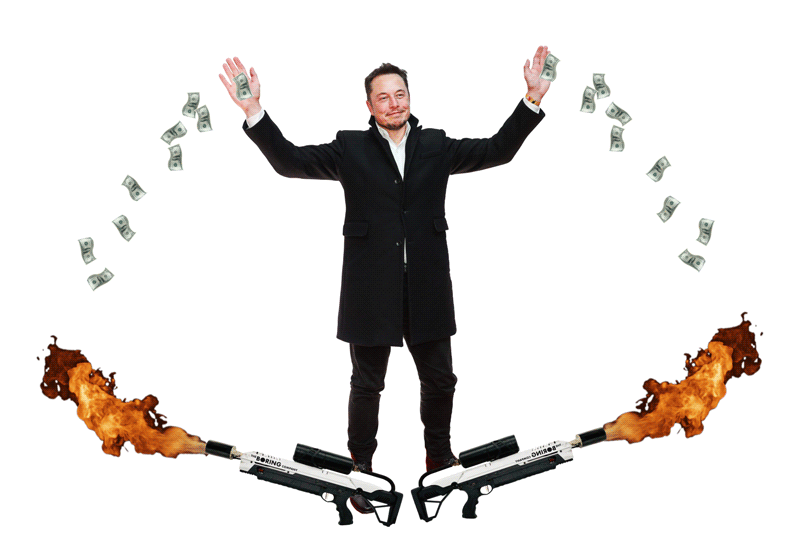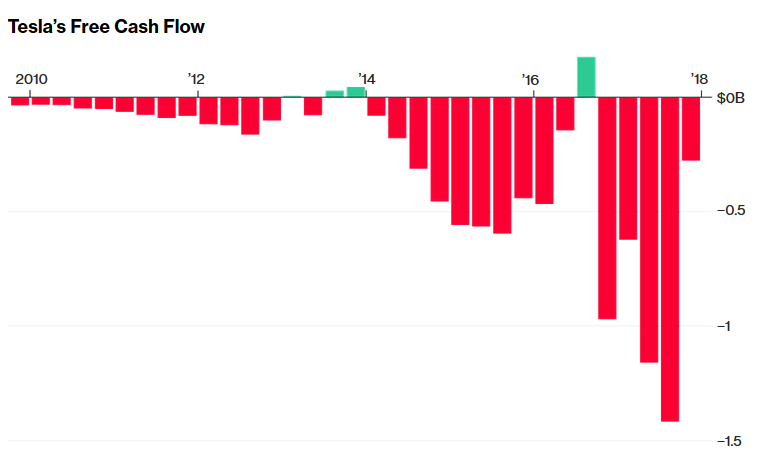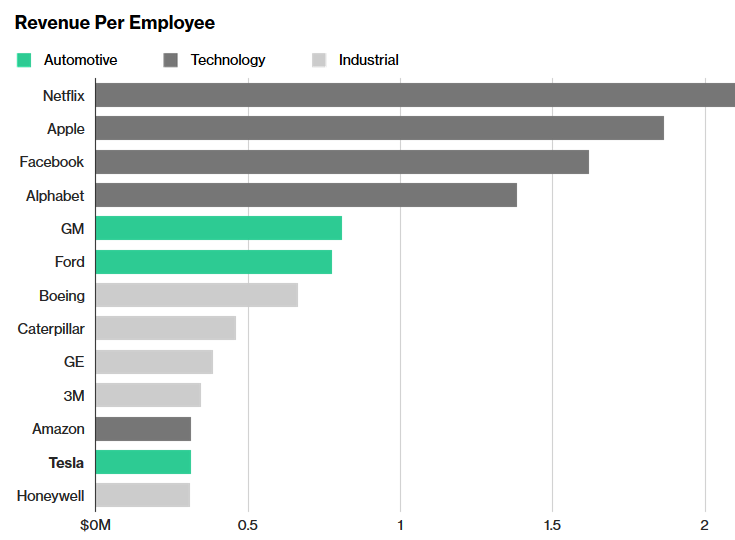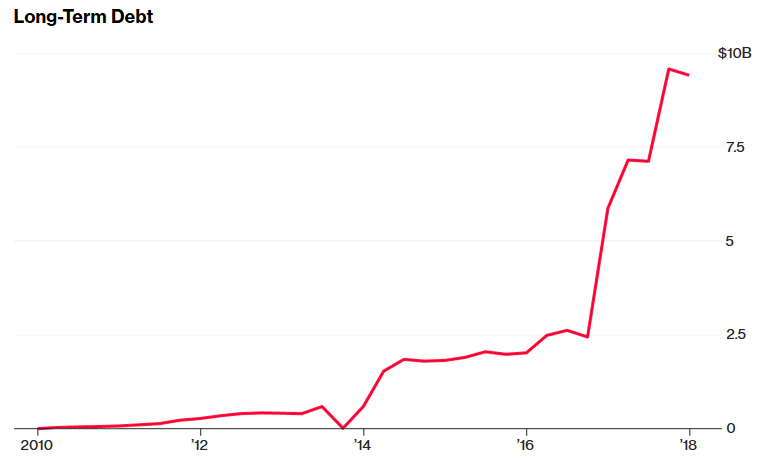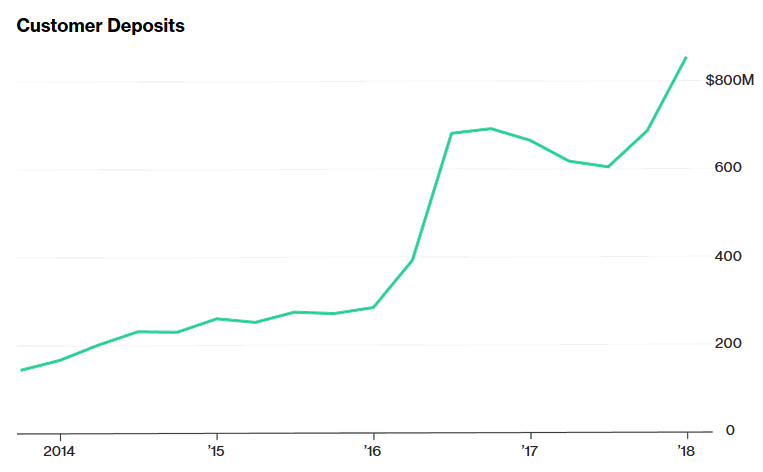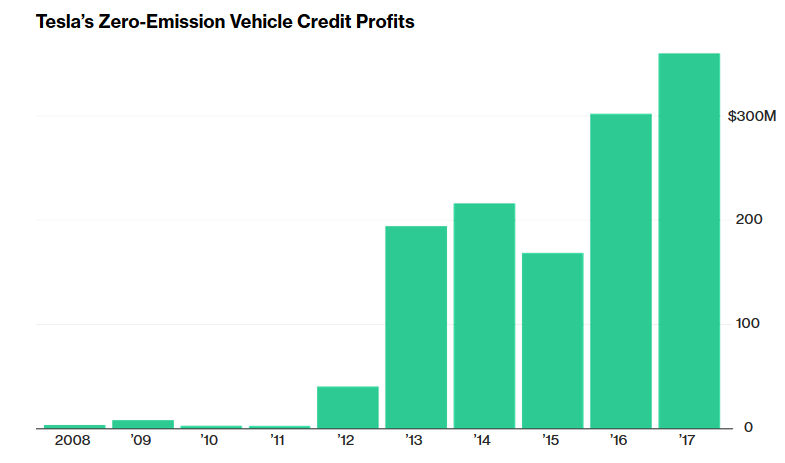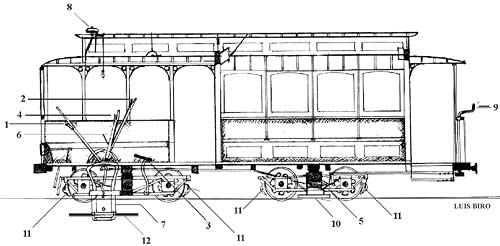Tesla Doesn’t Burn Fuel, It Burns Cash
A complete guide to how Elon Musk has raised, and then spent, billions of dollars.
By Dana Hull and Hannah Recht April 30, 2018
The company that Elon Musk built to usher in the electric-car future might not have enough cash to make it through the calendar year.
The anxieties that lurk beneath the tremendous ambition of Tesla Inc. moved into the forefront in recent weeks. The company again
fell far short of its own production targets for the mass-market Model 3 sedan, another person
died in a crash involving its assisted-driving feature and Musk entered into
a public dispute with federal safety regulators. Tesla’s once high-flying stock, buffeted by a downgrade from credit analysts, has dropped 24 percent from its peak in September.
There’s a good reason to worry: No one has raised or spent money the way Elon Musk has. Nor has any other chief executive officer of a public company made a
bankruptcy joke on Twitter at a time when so much seemed to be unraveling.
Tesla is going through money so fast that, without additional financing, there is now a genuine risk that the 15-year-old company could run out of cash in 2018. The company burns through more than $6,500 every minute, according to
data compiled by Bloomberg. Free cash flow—the amount of cash a company generates after accounting for capital expenditures—has been negative for five consecutive quarters. That will be a key figure to watch when Tesla reports earnings May 2.
Tesla makes three cars—the Model S and Model 3 sedans and the Model X SUV—at its only auto assembly plant, located in Fremont, California. There are
aggressive plans to add an electric semi truck, a new roadster sports car and crossover to the production lineup in the next few years. While Musk’s vision for the future once called for extreme automation, the present day is all about manpower. Back in 2010, Tesla had just 899 employees. Today, the company has nearly 40,000 workers.
The ongoing hiring binge is probably contributing to Tesla’s financial straits. Tesla has added employees faster than it has boosted revenue in three of the last four years. This includes more than doubling the workforce in 2017, when the company was scaling up for Model 3 production and took on employees from SolarCity Corp.
Tesla’s employee roster more than tripled from 2014 to 2017, and revenue per employee stagnated. General Motors Co. and Ford Motor Co. each bring in about 2.5 times as much revenue per employee. And Tesla’s swollen employee total doesn’t even account for what Musk recently characterized as a “Russian nesting doll” of contractor and subcontractor companies engaged in production at Tesla.
Since its founding in 2003, Tesla has been fueled by a kitchen-sink approach to finance shaped in the image of its chief executive. And the public face of the company has always been central to Tesla’s ability to raise money.
For the first seven years of the company’s existence, Tesla scraped by entirely on private and venture capital funds, the bulk of which came from Musk himself. In 2004, when Tesla raised $7.5 million in a Series A, Musk contributed $6.3 million and
assumed the chairman role on Tesla’s board. In the throes of the 2008 recession, as Tesla struggled to survive, Musk orchestrated a $40 million debt deal that closed on Christmas Eve,
hours before Tesla would have gone bankrupt.
Since its $225 million initial public offering in June 2010, Tesla has raised money by selling stock and convertible bonds, monetizing leases and floating junk bonds—the sort of thing almost any automaker might do. But the company has also been extraordinarily lucky. One rival, Daimler AG, made an early
strategic equity investment. Another rival, Toyota Motor Corp., became
an investor in May 2010 and sold the Fremont plant to Tesla for a bargain price.
Tesla’s clean-energy mission also sets it apart. The U.S. Department of Energy awarded Tesla a $465 million loan in 2010, which
Tesla paid off early and in full in 2013. No other automaker has so far been able to convince legions of fans to put deposit money behind a revolutionary agenda or take advantage of government subsidies for emission-free vehicles to the degree that Tesla has.
“Elon Musk is an engineer, and so he treats raising capital as one element that he needs to solve,” said Andrea James, a former analyst who observed Musk’s repeated trips to Wall Street and briefly worked for the company in investor relations.
Tesla ended 2017 with $3.4 billion in cash on hand and $9.4 billion in outstanding debt, a testament to Musk’s borrowing prowess. Many analysts believe that Tesla will need to raise money again—and soon.
Bruce Clark of Moody’s Investors Service
recently warned that Tesla will need an additional $2 billion this year, and he noted that $1.2 billion of existing debt will come due by 2019. Short sellers remain convinced that Tesla is on the verge of an epic meltdown. Famed investor Jim Chanos of Kynikos Associates has predicted the company is headed for a
“brick wall.”
But the 46-year-old Musk has a higher tolerance for risk than most. When Tesla
released figures for first-quarter vehicle production and deliveries April 3, the company stressed that once it can produce 5,000 Model 3 cars per week—an elusive target so far—it will have positive operating cash flow. The company said that it “does not require an equity or debt raise this year, apart from standing credit lines.”
Jeff Osborne of Cowen & Co. isn’t convinced, noting that the company has raised cash in the past after making similar claims. He predicts Tesla will need to raise $3 billion by selling stock during the fourth quarter and an additional $2 billion in late 2019 to keep company resources above $1 billion in cash.
There’s another way Tesla compares unfavorably to its more mature peers: Musk and company spent $146 million on interest payments for its massive debt in the past quarter—roughly the same interest expense as GM, a company with approximately 10 times more revenue.
"Elon Musk is one of our planet’s great hopes. I would offer a kidney to him if he needed it".
One of Tesla’s greatest strengths is its ability to monetize the patience and goodwill of its customers and loyal fans. The company is sitting on a staggering $854 million in customer deposits as of the end of 2017.
Since Tesla sells its products direct to consumers, without relying on a dealer network, customer deposits are cash payments that essentially serve as interest-free loans—and these loans can stretch on for years. If Tesla
were to go bankrupt, those deposit holders would likely be wiped out.
Tesla is holding customer deposits for two vehicles that aren’t even in production yet: an electric Tesla Semi ($20,000 deposit) and a next-generation Roadster (either $50,000 down or the $250,000 retail price paid up front to reserve a limited edition). Even customers interested in installing an array of solar roof panels or the company’s Powerwall home battery must hand over $1,000 to place an order.
Tesla doesn’t break out deposit numbers by car, but the vast majority comes from $1,000 reservations for the Model 3. When Musk first introduced the lower-priced sedan in March 2016, fans stood in long lines at Tesla stores. Two years later, the
slower-than-expected pace of production means that most of the more than 400,000 reservation holders are still waiting. And new people appear to be joining the queue: As of April, the company reported “net Model 3 reservations remained stable.”
There’s an additional source of free money from loyal believers: An unknown number of customers have paid up for vehicle features—$3,000 for “Full Self Driving” capability, for example—that Tesla thus far hasn’t figured out or released to anyone.
The consumer psychology that sees hundreds of thousands of people essentially extending an interest-free loan to a public company is unusual, to say the least. Consider the devotion of Bruce Sidlinger, a 60-year-old aerospace engineer who lives in Flagstaff, Arizona:
“The morning after the Roadster was announced, I put a deposit down. Putting down $50,000 for a Roadster that won’t be out for a few years is kind of like buying a bond that returns zero. Elon Musk is one of our planet’s great hopes. I would offer a kidney to him if he needed it.”
Keep in mind that Sidlinger already owns both a Model S and a Model X. He drove across the country to Florida earlier this year in a car made by one Musk company so he could watch a rocket made by another Musk company take flight for the first time.
Even after depositors complete the purchase of a car, Tesla has a way to squeeze further financial juice from the transaction. The company produces only electric vehicles, giving it a unique ability to take advantage of California’s zero-emission vehicle mandate.
Here’s how it works: California uses its air-pollution authority to force automakers into selling a set number of non-polluting vehicles. Those that fall short can buy credits from other automakers, and an all-electric automaker probably will have plenty of credits to sell.
Since 2008, Tesla has sold more than $1.3 billion in regulatory credits. In 2017, the company delivered 103,181 cars globally but earned $360.3 million selling these emission credits, or roughly $3,500 per car. (Tesla does not break down auto sales per region or for specific states; nine additional states have adopted California’s program).
Then, of course, there’s Tesla’s stock. Issuing new equity typically leads to dilution for existing shareholders—but not Musk. He has maintained control by regularly purchasing more shares and currently owns more than 33 million, or 20 percent of the company. The next largest shareholder, Fidelity, holds a 10 percent stake.
That was before Tesla shareholders in March voted to overwhelmingly approve an
unprecedented compensation plan for Musk—a $2.6 billion award, the largest of its kind. His new package of 20.3 million option shares vests if he raises the company’s market cap to $650 billion and meets revenue and earnings targets.
This will give Musk the opportunity to acquire even more shares. If the award fully vests, Musk would own a 28 percent stake worth about $184 billion.
This unusual move is meant to counter a common anxiety that Musk is getting restless. Besides running SpaceX, which
just authorized a $507 million fundraising round,
he has started an underground tunneling operation called Boring Co., which
recently raised $113 million in equity. (More than 90 percent of that came from Musk himself.) Fans are involved in the fundraising here, too, snapping up 50,000 Boring Co.
hats ($20 each) and 20,000
flamethrowers ($500).
The new compensation package offers an assurance that Musk will stay at Tesla. The plan allows him to eventually become chief product officer while someone else runs the company—though he or she will still ultimately report to Musk.
But at some point, even his ability to pull down money from believers will be challenged unless real earnings materialize, something Musk acknowledged in an all-employee email he sent on April 17 that
instantly leaked to reporters:
A fair criticism leveled at Tesla by outside critics is that you’re not a real company unless you generate a profit, meaning simply that revenue exceeds cost. It didn’t make sense to do that until reaching economies of scale, but now we are there. Going forward, we will be far more rigorous about expenditures. I have asked the Tesla finance team to comb through every expense worldwide, no matter how small, and cut everything that doesn’t have a strong value justification.
Musk recently admitted that
“excessive automation at Tesla was a mistake” and said that “humans are underrated,” an indication that the costly legions of employees won’t be shrinking as quickly as he once imagined. In that email, he vowed to hire hundreds of additional factory workers. Tesla lists
nearly 3,000 current job openings.
The fact that so much of his own wealth is on the line is part of what has so many investors willing to go along with him. “Elon Musk is all in,” says Ross Gerber of Gerber Kawasaki Wealth & Investment Management, an investor who has become one of the
loudest Tesla bulls. “There’s not another CEO in America who is taking as enormous of a financial risk on their company.”
Source: Data compiled by Bloomberg, company filings.
Note: Bloomberg calculates how much money Tesla is burning by taking the 12-month trailing free cash flow number ($-3,475.468M) and dividing that by the number of minutes in a year.
With assistance by: Claire Boston, Taka Endo, Tom Randall, Molly Smith, Craig Trudell, Brian Eckhouse and Brandon Kochkodin
That’s a point on which Tesla believers and skeptics can agree: No other public company chief is taking financial risk quite like Musk.

